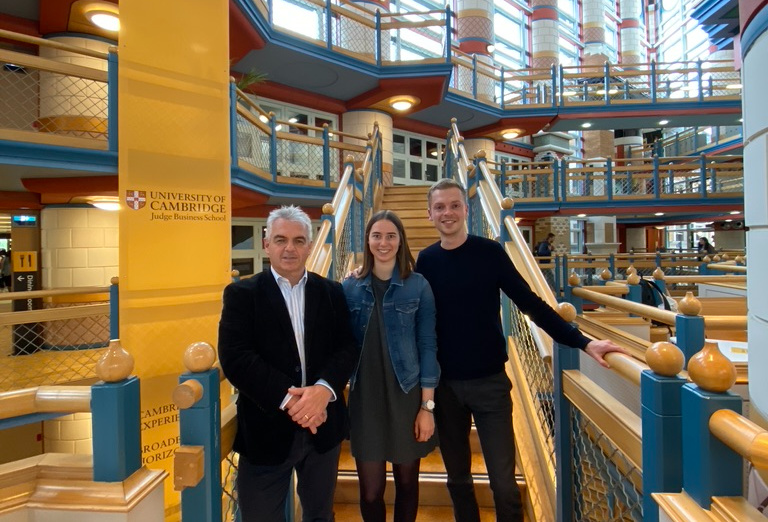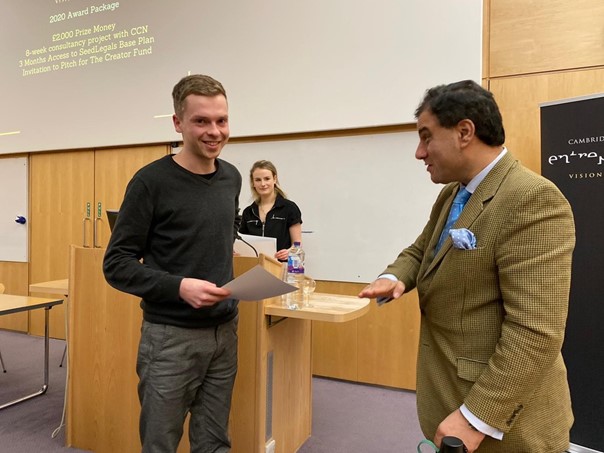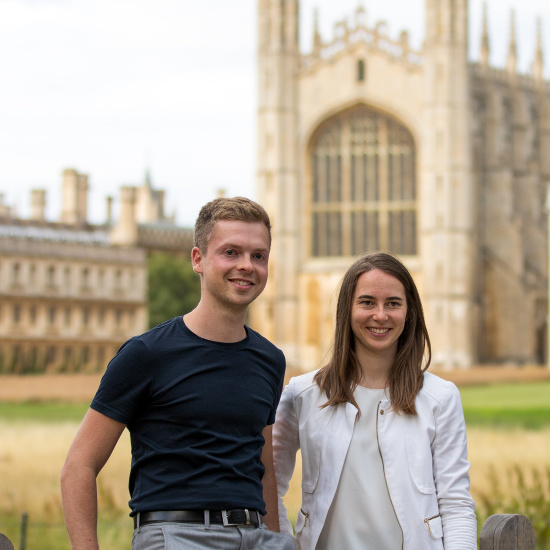
Nicola Filzmoser and Cornelius Palm are healthcare entrepreneurs, co-founders of Happyr Health and alumni of the MSt in Entrepreneurship programme.
Why we fell in love with Cambridge
Start-ups fail often. No matter how you define failure, the statement is true. If we talk about total liquidation, start-ups fail by around 30-40%. When it comes to failure to achieve performance forecasts, Shikhar Ghosh (HBS Prof. for Management) states that up to 95% fail. 1
There are numerous reasons for failure. According to CB-Insights, the top 3 are a lack of market need (42%), lack of funding (29%) and a suboptimal team (23%). I have experienced the failure of a young company myself. A social jewellery label that we launched with friends during our bachelor studies. Three young founders, no market need, no relevant industry experience, lack of team diversity, little capital, in a German-speaking culture where new founders have to prove themselves first. These are all factors that can easily be avoided if the environment is right.
The academic and applied learning environment
For Happyr Health, we chose Cambridge very strategically in advance. We wanted to stay in Europe for the early start-up phases. London leads Europe’s start-up ranking because of its high concentration of capital and abundance of talent.2 Cambridge is only a 45-minute train ride away and offers numerous advantages (see below) that we can appreciate as a digital health start-up.
Academic – Cambridge Judge Business School
Cambridge Judge Business School of the University of Cambridge offers a part-time master’s degree in entrepreneurship. As founders of Happyr Health, we have benefited incredibly from the experience of world-leading professors and our concepts have been rigorously improved through regular academic evaluation. Entrepreneurship requires many decisions in very uncertain situations. Through academic engagement with the subject, we have gained a lot of confidence to make well-founded decisions.

Applied – the Accelerator of the University of Cambridge
The University accompanies entrepreneurs not only academically but also practically with a world-class accelerator. This provides the link between experienced entrepreneurs, mentors and start-ups. It was great to get to know the UK business environment with experienced mentors on a fast-track, avoiding common mistakes and concluding legal matters early. Confident goals are easier to achieve when the theory is understood and a second, experienced opinion critically assesses our actions and supports us with the necessary social capital.

The healthy competition
Because the community of entrepreneurs in the accelerator is very supportive and of high quality, we can learn from each other and even feel motivated by the healthy competitive pressure to grow beyond our limits. Cambridge hosts numerous university competitions for start-ups every year. The Cambridge University Entrepreneurship Community has managed to make the £10,000 competition the largest student competition in the world, but there are plenty other opportunities across the UK for us to compete with entrepreneurs and to outgrow ourselves.

The talent pool
Entrepreneurs are no lone wolves. To create something from nothing, to go from 0 to 1, you need the support of many helping hands. The university has a massive influence on the city of Cambridge. About every fifth inhabitant is a student, the diversity of backgrounds is enormous. The land you walk on, the buildings you visit, everything belongs to the university. As alumni, we have access to a large network of helpful students and professors. They often help us professionally, connect us with other experts or sometimes even support us as volunteers to cope with the enormous workload. Cambridge is also relatively small. A place where we can naturally build our network. You quickly evolve from colleagues to acquaintances to friends. And as soon as sufficient financial resources are available, growth is easier if you have a large network of talent at your disposal.
Students punting on the cam river. Photo by Scott Spedding
Global companies and institutions
Cambridge is also called Europe’s “Silicon Fen”. Many global companies like AstraZeneca, Microsoft and Apple are located here. This not only attracts highly educated talents from all over the world, but it also makes possible partnerships between start-ups and established players much more likely.
Setting up a private limited company
Minimizing and simplifying bureaucratic processes is not only useful in pandemic situations. As a start-up, you can register your company in Great Britain in a few minutes and for £12. When we think about the high failure rate of start-ups, it is important to think in ahead – Liquidation of the company is also comparably uncomplicated.
Funding
Start-ups can be funded in many ways. These range from loans, grants, awards and prize money to private investments or in the best-case sales. In Cambridge, we have seen great initiatives, such as the aforementioned start-up competitions (see above: The Healthy Competition) or .i.e. awards from the Santander Bank. While COVID caused us difficulties in the pre-seed round, we were generously supported in our crowdfunding campaign, to a large extent by the Cambridge network, and also because the crowdfunding processes were uncomplicated and fast. UK government grant programs are transparent and easy to find and can cover 50% – 100% of research and development costs.
Start-up valuations are lower in Europe than in the United States. However, the community of private investors in Cambridge is well developed and professional. Mentors and personal contacts help us as founders to network with strategic investors and establish fair conditions for all parties involved. Many new early-stage initiatives are developing and the proximity to London also aids in fundraising for private capital.
The well-being of the founders
We as founders do not want to run a sprint, but a marathon, to have a long-term positive effect in the entrepreneurial arena. That is why it is important that we feel good in Cambridge. Fortunately, it is relatively easy to feel at home in Cambridge. Even though the city is small, there is always something new to discover and the diversity of people makes the place a pleasant bubble of different backgrounds. The old town and college buildings are beautiful. Cambridge is very green with many parks. The Cam River, where the college teams train in the morning, calmingly meanders through the city. It is not uncommon to see Cambridge cows in the city’s parks. The main means of transport in Cambridge is the bicycle, which is also an excellent way to get out of the city and relax in Grantchester by taking a walk in the countryside.

The British culture and mentality
As founders, we talk to many people about our project. This helps us to develop our ideas further, gather new impressions and learn. If you are met with criticism (and e.g. missing suggestions for improvement) right at the beginning, this can be very disconcerting. When we presented our initial and very immature concepts to the British, we were usually encouraged to continue. We always met the British in a friendly and helpful manner. We were quickly linked to personal contacts or arranged a follow-up appointment. In Cambridge (and the rest of the UK) it happens regularly that high-ranking people from e.g. management positions spend time with us to help and without expecting any return. I know that British people are self-critical of their start-up culture. As in other parts of Europe, the culture is too risk-averse and lacks the big capital. As German-speaking founders, we perceive culture as innovative and open to creative ideas. Instead of burning a lot of money in the case of quick failure, in the UK, you can try things out in sandboxes and the national domain before entering the growth phase. Put simply, you can develop a product in the UK and then grow it in the US.
Is Cambridge the holy grail for startups?
Although Cambridge offers Happyr Health very good conditions, we don’t believe that Cambridge offers the same for everyone. Many start-ups here are highly technological, the teams are scientific, and the scene is also adapted to this in the private investment community. Start-ups whose focus is more consumer-oriented or whose teams have no direct connection to the university are less likely to benefit from the Cambridge environment. But we are sure that there is a suitable ecosystem for every start-up focus. An individual ecosystem that can support the teams in their unique missions to reduce the failure rate of start-ups and increase the joy of entrepreneurship.
1 https://hbswk.hbs.edu/item/why-companies-failand-how-their-founders-can-bounce-back
2 https://www.startupblink.com/blog/the-best-startup-cities-in-europe/
